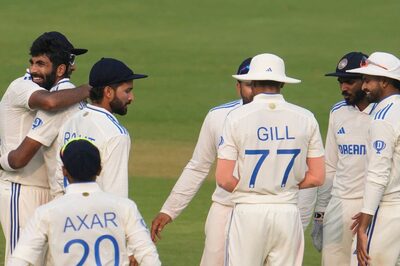
views
The high point of success for China’s strategy to punish India was the Clinton-Jiang Zemin Summit meeting on 27 June 1998. The two leaders issued a stand-alone Joint Statement on South Asia, which was by and in itself not acceptable to India. Matters were made worse by the wording of the document, which suggested that the Americans were giving the Chinese a central role in the maintenance of peace and stability in South Asia. Clinton had already publicly acknowledged such a role for China, during his remarks to the White House Press Corps in the White House Rose Garden on 3 June. India viewed this as an overt manifestation of American alignment with China against India, somewhat akin to Nixon’s 1972 tilt to China. It was a low point for the Indo-US relationship. One of its consequences was the absence of any meaningful contact between the embassies of the two countries in Beijing and in the shunning of Indian diplomats at the annual Fourth of July reception that was hosted by Jim Sasser, the US Ambassador to China on 3 July 1998.
It was at this point that the Chinese may have made their first mistake. They assumed that the Americans would follow through on their strategy of thoroughly punishing India. In reality, Deputy Secretary Strobe Talbott had been tasked by President Clinton to open discussions with Jaswant Singh, a senior member of the National Democratic Alliance Government. The Chinese did not appear to get wind of this until much later. The Vajpayee letter that the Clinton administration had leaked, had been drafted carefully. Prior to this, Vajpayee’s team had made their own assessment about the Americans and concluded that the initial US response to the nuclear tests by India would not be the final American position. Vajpayee had personally probed American Ambassador Frank Wisner in August 1996 to get his sense about the possible implications for India if it went ahead with the tests. BJP leaders, although not in office for long, had been in politics for decades and understood well the nuances of international politics.
The Indian side chose elements from the Chinese playbook in 1964 in order to blunt the Chinese case against them. China had also referred to the existence of a nuclear threat (from the US in their case) and of the transfer of nuclear weapons into the hands of another (to the West German ‘revanchists’, as Xinhua put it in its statement of 16 October 1964) to build their case. The Indian side also correctly assessed that the nuclear tests would pose a dilemma to the United States.
On the one hand, a weak US response to India’s tests could challenge the US-led global nuclear non-proliferation efforts, while on the other hand a harsher response might disrupt Clinton’s plans to strengthen ties with India. Hence Clinton, while imposing sanctions, also proposed bilateral engagement on the nuclear issue. Vajpayee responded positively to Clinton’s proposal for discussions and appointed Jaswant Singh to negotiate. Strobe Talbott, the American negotiator, was to recall that he met Jaswant Singh fourteen times at ten locations in seven countries on three continents. There was no one better than Singh to engage the Americans in a didactic discussion on the matter. Jaswant Singh, in his memoirs, later said that he was well aware that Clinton had less than three years left in his second term, and that he leveraged this time constraint to extract India from the sanctions (although his process was completed only during the Bush administration that followed) without conceding the core positions on the NPT and the CTBT.
In the meantime, by the time the third hearing on India’s nuclear tests took place in the US Congress on 13 July 1998, the Indian narrative was also beginning to resonate in other quarters in Washington, most notably on Capitol Hill (the earlier hearings had taken place on 13 May and 3 June). Indian Ambassador Naresh Chandra assiduously worked both sides of the Congressional aisle, and also roped in diplomatic seers such as Henry Kissinger by pushing the argument that in the long-term geo-political context, India’s nuclear tests were good for the United States. Naresh Chandra’s diplomatic efforts proved critical to India’s strategy in Washington. This gave an opportunity for the Republicans, then in Opposition, to put space between themselves and the Democratic Party on the nuclear issue. Talbott also acknowledged the difficulties that the Clinton administration faced in maintaining firm Congressional support for a tough India policy given the pro-Indian sentiment in both parties on Capitol Hill.
In the third meeting on the Hill on 13 July, Senator Sam Brownback pointedly asked Assistant Secretary Inderfurth about the Indian security concerns regarding China, which he had so blithely swatted away during his initial testimony on 13 May. Brownback averred that he and his colleague, Senator Charles S. Robb, had got an earful from Indian officials about the Jiang-Clinton Joint Statement on South Asia and the perceived US lack of sensitivity towards India’s security concerns about China. This prompted Inderfurth to reverse his position: ‘We do not believe nor have we stated that China should serve as a mediator in South Asian security matters.’ Inderfurth also claimed in his testimony that the Americans had been able to secure a Chinese commitment to engage with India, but later admitted that they had ‘listened very carefully to what we had to say’ without giving any firm commitment to talk to India.
In fact, the Chinese were doing precisely the opposite of what Inderfurth had claimed. They stepped up their efforts to keep India isolated and under international pressure. This is where the Chinese possibly might have committed another error of judgement with regard to their understanding of US policy. Their successful working relationship with the Americans during the NPT Review in 1995 and the CTBT negotiations in 1996 may, perhaps, have led them to think that the issue of non-proliferation was so important to the Americans that they would not waver in punishing India. In truth, a certain contempt for India had crept into Chinese thinking. This might have led them to overlook the fact that although India, by conducting the nuclear tests, had upset the American cart on non-proliferation matters, it still mattered for Clinton in terms of resuscitating the democratic partnership and in facilitating American entry into the Indian market. The Chinese possibly assumed that India would never be an attractive alternative to the Chinese in Asia, and this assumption led to a misreading of US policy post the Clinton-Jiang Zemin Summit.
Read all the Latest News, Breaking News and Coronavirus News here.


















Comments
0 comment